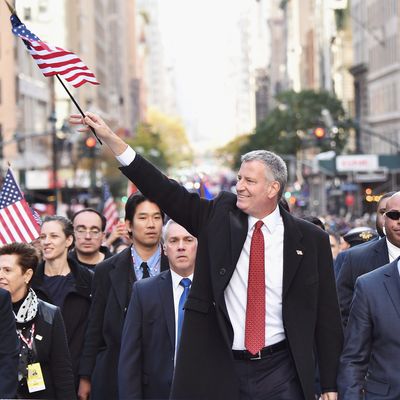
As the United States seeks to understand what the hell happened on Election Day, one of the most helpful frames for understanding is the urban-rural divide. Consider the below cartogram, where the U.S. map is skewed according to population. Not only is it weird and ugly, but also useful:
The blue girth speaks to how, while cities occupy little of America’s geography, they contain a ton of the humanity. Thanks to the structure of the Electoral College, the people who live in the cities have their presidential votes matter less than those in rural areas — with a ginormous cultural divide between the two. While the nation’s urban dwellers might feel short-changed by the election, there’s reason to believe that cities themselves are the best bulwarks against the forthcoming Trump White House.
That’s according to Fordham University political theorist Benjamin Barber, author of If Mayors Ruled the World. America’s cities are “the one institution today that still works, where government functions, where trust levels are double the levels of other institutions,” he told Quartz. This dynamic is seen not just in the U.S.: The instability of the national governments, Barber says, can be seen in Brexit, the rise of right-wing governments in Hungary and Poland, and the ascendance of a populist demagogue in the Philippines — to name but a few of the leading examples.
In a post for the Nation, Barber lays out the urban-rural divide at a global scale:
The role of cities rests on right: the obligation under the Social Contract to uphold the life, liberty, and sustainability of their citizens, something nation states have shown themselves increasingly incapable of doing. Once upon a time, nations aspired to universality, and local jurisdictions were parochial and particularistic. Today the valence is reversed, and cities speak to global common goods—marriage rights, minimum wage, climate action, creative culture, refuge for immigrants—while nations have grown parochial and xenophobic. Urbanity is a global virtue associated with diversity and multiculturalism; nationalism has a parochial character upheld by walls.
Such has been the case in the United States. While Congress is red, 17 of the country’s 20 largest cities have Democratic mayors, and it shows in policy. In 2014, Seattle approved a $15-dollar-an-hour minimum wage (just last week, Washington State approved a $13.50 wage — one of four states to approve such hikes). Louisville has declared itself to be a Compassionate City. New York has a shelter mandate for the homeless. Last year, the city introduced the IDNYC card, and over half of the 850,000 card holders are undocumented. Mayor Bill de Blasio has said that if a President Trump tried to get the data, he’d be in for a “real fight” — to the point of deleting the database. “We are not going to sacrifice a half million people who live among us,” he said. “We’re not going to tear families apart. We will do everything we know how to do to resist that.”
While the federal government may become less interested in social justice come January, city governments can still be a progressive force. “Roe v. Wade guarantees a national right but even in the absence of a national right, if it is overturned, cities and states can themselves insist on those rights,” Barber said. “In New York and Chicago, and Atlanta and New Orleans and San Diego, they can say ‘abortion is legal and protected.’”
The most radical idea Barber proposes is that maybe, just maybe, more of the tax dollars generated in cities should serve the municipality — and the homeless, poor, and otherwise disadvantaged living there — rather than being siphoned off to Washington. Cities create 80 percent of American GDP and tax revenue, Barber likes to say. As he describes it, it’s a Marxist dynamic: Cities are the labor, and the government is the capital. (The capitol is the capital, you might say). And as any labor force does to gain leverage on management, it organizes: thus the U.S. Conference of Mayors, EuroCities, and a United Nations–like body that Barber helped found — the new Global Parliament of Mayors. Ironically, this is an old conservative talking-point: less national power, more local power. But in this case, it’s not about keeping gun rights; it’s social services. The path of effective resistance would be through greater unity among American cities and their governments. “It’s one thing for Washington to say it’s not going to do health care and social safety nets,” Barber says, “it’s another to say we will not let cities do it.”




